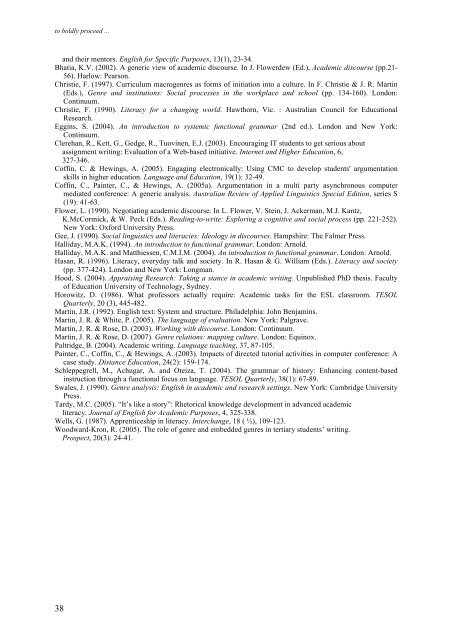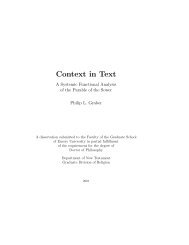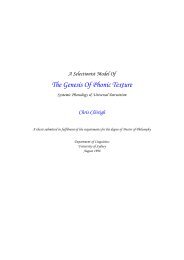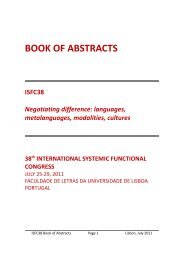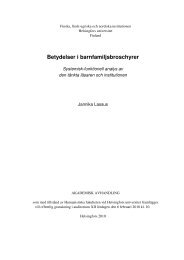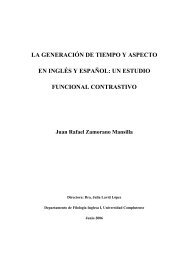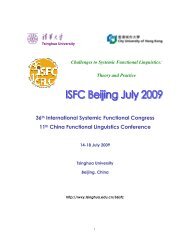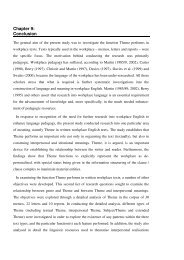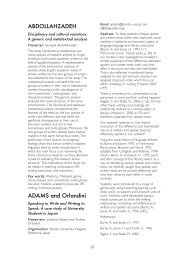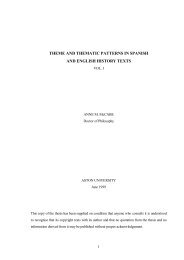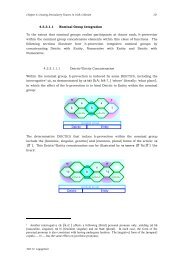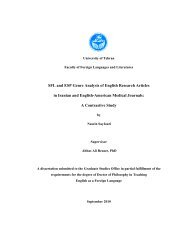to boldly proceed ...and <strong>the</strong>ir mentors. English for Specific Purposes, 13(1), 23-34.Bhatia, K.V. (2002). A generic view of academic discourse. In J. Flowerdew (Ed.), Academic discourse (pp.21-56). Harlow: Pearson.Christie, F. (1997). Curriculum macrogenres as forms of initiation into a culture. In F. Christie & J. R. Martin(Eds.), Genre and institutions: Social processes in <strong>the</strong> workplace and school (pp. 134-160). London:Continuum.Christie, F. (1990). Literacy for a changing world. Hawthorn, Vic. : Australian Council for EducationalResearch.Eggins, S. (2004). An introduction to systemic functional grammar (2nd ed.). London and New York:Continuum.Clerehan, R., Kett, G., Gedge, R., Tuovinen, E.J. (2003). Encouraging IT students to get serious aboutassignment writing: Evaluation of a Web-based initiative. Internet and Higher Education, 6,327-346.Coffin, C. & Hewings, A. (2005). Engaging electronically: Using CMC to develop students' argumentationskills in higher education. Language and Education, 19(1): 32-49.Coffin, C., Painter, C., & Hewings, A. (2005a). Argumentation in a multi party asynchronous computermediated conference: A generic analysis. Australian Review of Applied Linguistics Special Edition, series S(19): 41-63.Flower, L. (1990). Negotiating academic discourse. In L. Flower, V. Stein, J. Ackerman, M.J. Kantz,K.McCormick, & W. Peck (Eds.). Reading-to-write: Exploring a cognitive and social process (pp. 221-252).New York: Oxford University Press.Gee, J. (1990). Social linguistics and literacies: Ideology in discourses. Hampshire: The Falmer Press.Halliday, M.A.K. (1994). An introduction to functional grammar. London: Arnold.Halliday, M.A.K. and Matthiessen, C.M.I.M. (2004). An introduction to functional grammar. London: Arnold.Hasan, R. (1996). Literacy, everyday talk and society. In R. Hasan & G. William (Eds.). Literacy and society(pp. 377-424). London and New York: Longman.Hood, S. (2004). Appraising Research: Taking a stance in academic writing. Unpublished PhD <strong>the</strong>sis. Facultyof Education University of Technology, Sydney.Horowitz, D. (1986). What professors actually require: Academic tasks for <strong>the</strong> ESL classroom. TESOLQuarterly, 20 (3), 445-482.Martin, J.R. (1992). English text: System and structure. Philadelphia: John Benjamins.Martin, J. R. & White, P. (2005). The language of evaluation. New York: Palgrave.Martin, J. R. & Rose, D. (2003). Working with discourse. London: Continuum.Martin, J. R. & Rose, D. (2007). Genre relations: mapping culture. London: Equinox.Paltridge, B. (2004). Academic writing. Language teaching, 37, 87-105.Painter, C., Coffin, C., & Hewings, A. (2003). Impacts of directed tutorial activities in computer conference: Acase study. Distance Education, 24(2): 159-174.Schleppegrell, M., Achugar, A. and Oteiza, T. (2004). The grammar of history: Enhancing content-basedinstruction through a functional focus on language. TESOL Quarterly, 38(1): 67-89.Swales, J. (1990). Genre analysis: English in academic and research settings. New York: Cambridge UniversityPress.Tardy, M.C. (2005). “It’s like a story”: Rhetorical knowledge development in advanced academicliteracy. Journal of English for Academic Purposes, 4, 325-338.Wells, G. (1987). Apprenticeship in literacy. Interchange, 18 ( ½), 109-123.Woodward-Kron, R. (2005). The role of genre and embedded genres in tertiary students’ writing.Prospect, 20(3): 24-41.38
Papers from <strong>the</strong> 39th ISFCEngaging with o<strong>the</strong>rs by establishing academic stances in <strong>the</strong>context of English as a Foreign LanguageWidhiyantoUniversity of WollongongBuilding 22.108 Northfields Avenue Gwynneville Wollongong 2522w463@uowmail.edu.auAbstractThis paper reports on a preliminary investigation of how an undergraduate student in Indonesia engages witho<strong>the</strong>rs by establishing her academic stances through her <strong>the</strong>sis. The investigation focuses on <strong>the</strong> writer’slinguistic choices in relation to distribution of interpersonal meaning throughout <strong>the</strong> text. It is particularlyconcerned with <strong>the</strong> writer’s efforts in managing social relationships while establishing an authorial identity inrelation to <strong>the</strong> body of knowledge, <strong>the</strong> readers, and experts in <strong>the</strong> field. This study is underpinned by <strong>Systemic</strong><strong>Functional</strong> Linguistics, and is specifically informed by Appraisal <strong>the</strong>ory. The data source is an undergraduate<strong>the</strong>sis analyzed using <strong>the</strong> ENGAGEMENT system frameworks. The text analyzed in this study seems to presentinadequate and inappropriate engagement between <strong>the</strong> writer and <strong>the</strong> putative readers and <strong>the</strong> sources cited. Apedagogical implication is that <strong>the</strong> deployment of language in <strong>the</strong> development of engagement between <strong>the</strong>writer and <strong>the</strong> reader, and <strong>the</strong> writer and co-texts need to be explicitly taught to student writers in <strong>the</strong> Indonesiancontext.1 IntroductionThis study arises out of a concern that student writers in <strong>the</strong> context of English as a foreignlanguage (EFL) in Indonesia experience difficulties in bringing in o<strong>the</strong>rs into <strong>the</strong>ir academictexts. Such a relationship is mainly constructed through <strong>the</strong> writers’ efforts in engaging witho<strong>the</strong>r texts while establishing <strong>the</strong>ir own presence in <strong>the</strong>ir own texts. These two textualoperations are achieved through <strong>the</strong> use of interpersonal resources. Interpersonal meaning,which is shaped by <strong>the</strong> language choices <strong>the</strong> writers employ, functions to represent socialrelations and social identities (Fairclough, 1992). This meaning helps writers construct anacademic stance with respect to <strong>the</strong> knowledge, <strong>the</strong> readers, and o<strong>the</strong>r experts in <strong>the</strong> field. Indoing so, <strong>the</strong>y create certain prosodies of interpersonal meaning in <strong>the</strong>ir texts. Anunderstanding of <strong>the</strong> patterns of <strong>the</strong> prosody of interpersonal meaning and <strong>the</strong>ir functions intexts helps to establish academic stance in academic discourse (Hood, 2006, p.37).In many cases, student writers face problems in engaging with English academic genres.One reason could be that academic discourse communities require “characteristic kinds ofrelationship and practices that are enacted in or through discourse” (Hood 2004, p.24).Student writers, particularly from EFL contexts, such as in Indonesia, may not be aware of<strong>the</strong>se relationships and practices. This lack of knowledge may prevent <strong>the</strong>m from mastering<strong>the</strong> genres. Student writers, in this context, have to struggle with both <strong>the</strong> English languageand <strong>the</strong> codes of practices of <strong>the</strong> academic community. In addition, <strong>the</strong> idea that ‘written textsin tertiary education should sound argumentative’ (Lee, 2006) may also be unfamiliar to<strong>the</strong>m. Consequently, students are still unable to productively negotiate meaning in <strong>the</strong>ir texts.However, in <strong>the</strong> last decade or so Australian genre-based education has increasinglyinfluenced <strong>the</strong> Indonesian traditions in how teaching and learning of English academicwriting should be carried out. With <strong>the</strong> introduction of genre approaches, students’ awarenessabout crafting <strong>the</strong> meanings <strong>the</strong>y communicate in <strong>the</strong>ir texts has been heightened. Emilia(2005) claims that genre-based pedagogy has enhanced <strong>the</strong> written academic discoursepractices especially in students’ performance in <strong>the</strong>ir argumentative skills.39


